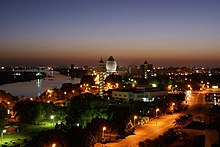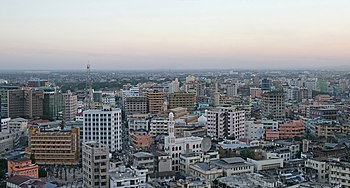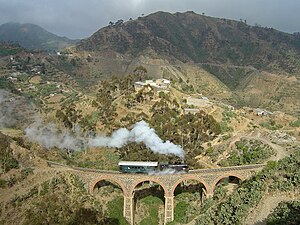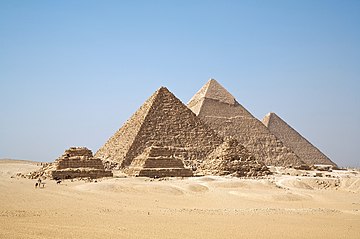Portal:Africa



Africa is the world's second-largest and second-most populous continent after Asia. At about 30.3 million km2 (11.7 million square miles) including adjacent islands, it covers 20% of Earth's land area and 6% of its total surface area. With nearly 1.4 billion people as of 2021, it accounts for about 18% of the world's human population. Africa's population is the youngest among all the continents; the median age in 2012 was 19.7, when the worldwide median age was 30.4. Based on 2024 projections, Africa's population will reach 3.8 billion people by 2099. Despite a wide range of natural resources, Africa is the least wealthy continent per capita and second-least wealthy by total wealth, ahead of Oceania. Scholars have attributed this to different factors including geography, climate, corruption, colonialism, the Cold War, and neocolonialism. Despite this low concentration of wealth, recent economic expansion and a large and young population make Africa an important economic market in the broader global context. Africa has a large quantity of natural resources and food resources, including diamonds, sugar, salt, gold, iron, cobalt, uranium, copper, bauxite, silver, petroleum, natural gas, cocoa beans, and.
Africa straddles the equator and the prime meridian. It is the only continent to stretch from the northern temperate to the southern temperate zones. The majority of the continent and its countries are in the Northern Hemisphere, with a substantial portion and a number of countries in the Southern Hemisphere. Most of the continent lies in the tropics, except for a large part of Western Sahara, Algeria, Libya and Egypt, the northern tip of Mauritania, and the entire territories of Morocco, Ceuta, Melilla, and Tunisia, which in turn are located above the tropic of Cancer, in the northern temperate zone. In the other extreme of the continent, southern Namibia, southern Botswana, great parts of South Africa, the entire territories of Lesotho and Eswatini and the southern tips of Mozambique and Madagascar are located below the tropic of Capricorn, in the southern temperate zone.
Africa is highly biodiverse; it is the continent with the largest number of megafauna species, as it was least affected by the extinction of the Pleistocene megafauna. However, Africa also is heavily affected by a wide range of environmental issues, including desertification, deforestation, water scarcity, and pollution. These entrenched environmental concerns are expected to worsen as climate change impacts Africa. The UN Intergovernmental Panel on Climate Change has identified Africa as the continent most vulnerable to climate change.
The history of Africa is long, complex, and varied, and has often been under-appreciated by the global historical community. In African societies the oral word is revered, which has led anthropologists to term them oral civilisations rather than literate civilisations. The historical process is largely a communal one, with eyewitness accounts, hearsay, reminiscences, and occasionally visions, dreams, and hallucinations, crafted into oral traditions. Time is sometimes mythical and social, and truth generally viewed as relativist. The lack of comprehensive written records has meant that African historiography was largely conceived by outsiders (Europeans and Arabs) with still tasked with building the institutional frameworks, incorporating African epistemologies, and enforcing an African perspective.. (Full article...)
Selected article –
The African Great Lakes (Swahili: Maziwa Makuu; Kinyarwanda: Ibiyaga bigari) are a series of lakes constituting the part of the Rift Valley lakes in and around the East African Rift. The series includes Lake Victoria, the second-largest freshwater lake in the world by area; Lake Tanganyika, the world's second-largest freshwater lake by volume and depth; Lake Malawi, the world's eighth-largest freshwater lake by area; and Lake Turkana, the world's largest permanent desert lake and the world's largest alkaline lake. Collectively, they contain 31,000 km3 (7,400 cu mi) of water, which is more than either Lake Baikal or the North American Great Lakes. This total constitutes about 25% of the planet's unfrozen surface fresh water. The large rift lakes of Africa are the ancient home of great biodiversity, and 10% of the world's fish species live in this region.
Countries in the area which are bounded by the lakes of the Great Lakes region include Burundi, the Democratic Republic of the Congo, Ethiopia, Kenya, Malawi, Mozambique, Rwanda, Zambia, Tanzania, and Uganda. (Full article...)
Featured pictures –
Did you know (auto-generated) -

- ... that Jérôme Chappellaz wants to collect ice cores from Africa's Mount Kilimanjaro to be preserved in Antarctica?
- ... that Frank Jeremiah Armstrong, the first African-American graduate of Cornell College, became an assistant to Booker T. Washington?
- ... that the bronze statue atop Thomas Eyre Macklin's 1907 South African War Memorial in Newcastle became known as the "Dirty Angel"?
- ... that Togo's abortion law was one of the first in Africa to allow abortion in the case of rape?
- ... that the African Union has set up a space agency in a Space City?
- ... that Freedom of Religion South Africa filed an unsuccessful lawsuit to keep child spanking legal?
Categories
Selected biography –
Ahmed Hassan Zewail (February 26, 1946 – August 2, 2016) was an Egyptian-American chemist, known as the "father of femtochemistry". He was awarded the 1999 Nobel Prize in Chemistry for his work on femtochemistry and became the first Egyptian and Arab to win a Nobel Prize in a scientific field, and the second African to win a Nobel Prize in Chemistry. He was the Linus Pauling Chair Professor of Chemistry, a professor of physics, and the director of the Physical Biology Center for Ultrafast Science and Technology at the California Institute of Technology. (Full article...)
Selected country –
 |
 |
|

| ||
Zimbabwe, officially the Republic of Zimbabwe, is a landlocked country in southern Africa, between the Zambezi and Limpopo rivers. It borders South Africa to the south, Botswana to the southwest, Zambia to the northwest, and Mozambique to the east. The name Zimbabwe derives from "Zimba Remabwe" meaning "big house of stone" in the Shona language. Its use as the country's name is a tribute to Great Zimbabwe, site of the capital of the Empire of Great Zimbabwe. Zimbabwe's highest peak is Mount Nyangani, which lies within Nyanga National Park in the east of the country. The official language of Zimbabwe is English, however the majority of the population speaks Shona.
Under the leadership of former president Robert Mugabe and the current president Emmerson Mnangagwa, the economy of Zimbabwe declined from one of the strongest in Africa to one of the weakest and political tension has never been higher. In 1999, the Movement for Democratic Change was established and have campaigned for an end to "Mugabe's Reign of Terror". 80% of Zimbabweans are unemployed and inflation has soared to well over 15,000%. (Read more...)
Selected city –

Khartoum or Khartum (/kɑːrˈtuːm/ kar-TOOM; Arabic: الخرطوم, romanized: al-Khurṭūm, pronounced [al.xur.tˤuːm]) is the capital of Sudan. With a population of 6,344,348, Khartoum's metropolitan area is the largest in Sudan.
Khartoum is located at the confluence of the White Nile – flowing north from Lake Victoria – and the Blue Nile, flowing west from Lake Tana in Ethiopia. Divided by these two parts of the Nile, the Khartoum metropolitan area is a tripartite metropolis consisting of Khartoum proper and linked by bridges to Khartoum North (الخرطوم بحري al-Kharṭūm Baḥrī) and Omdurman (أم درمان Umm Durmān) to the west. The place where the two Niles meet is known as al-Mogran or al-Muqran (المقرن; English: "The Confluence"). (Full article...)
In the news
- 12 February 2024 –
- Two boats collide on the Congo River near Kinshasa, Democratic Republic of the Congo; with the death toll remains unclear. (AP)
- 11 February 2024 – 2023 Africa Cup of Nations
- In association football, hosts Ivory Coast win their third Africa Cup of Nations by defeating Nigeria 2–1 in the final. Sébastien Haller scores the winning goal in the 81st minute. (The Guardian)
- 10 February 2024 – Somali civil war
- Four Emirati soldiers and a Bahraini military officer are killed, while ten other people are injured, when a soldier opens fire at a military base in Mogadishu, Somalia, before being killed in the ensuing shootout. Al-Shabaab claims responsibility. (AP)
- 10 February 2024 –
- A Eurocopter EC130 helicopter crashes near Nipton, California, United States, killing all the six people on board, including Nigerian banker Herbert Wigwe. (CBS News)
- 10 February 2024 – 2023–2024 Senegalese protests
- Violent protests occur in Senegal following an announcement by President Macky Sall that presidential elections have been delayed from February 25 to December 15. (Sky News)
- 9 February 2024 –
- At least 18 people are killed during a collision between a bus and a truck on a road in Kinshasa, Democratic Republic of the Congo. (AP)
Updated: 16:33, 14 February 2024
General images -
Africa topics
More did you know –

- ... that the British Museum's oldest African-American object is the Akan Drum (pictured) that was used to "dance the slaves"?
- ... that L.C. Lecesne rose to prominence as an activist against slavery after the British Government compensated him for his illegal exile from Jamaica?
- ... that despite receiving a budget allocation in 2003, the public sports stadium in Gibeon, Namibia, hadn't been repaired as of December 2007?
- ... that Thomas Edward Wilkinson was made Bishop of Zululand after his predecessor in South Africa, John Colenso, was excommunicated?
Related portals
Major Religions in Africa
North Africa
West Africa
Central Africa
East Africa
Southern Africa
Associated Wikimedia
The following Wikimedia Foundation sister projects provide more on this subject:
-
Commons
Free media repository -
Wikibooks
Free textbooks and manuals -
Wikidata
Free knowledge base -
Wikinews
Free-content news -
Wikiquote
Collection of quotations -
Wikisource
Free-content library -
Wikispecies
Directory of species -
Wikiversity
Free learning tools -
Wikivoyage
Free travel guide -
Wiktionary
Dictionary and thesaurus
























































































